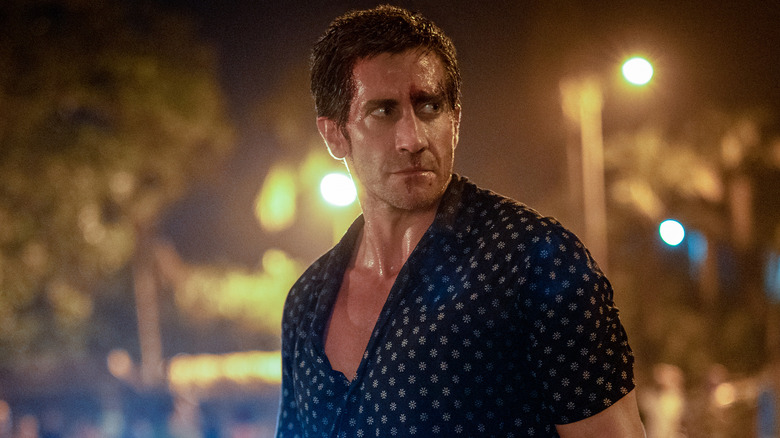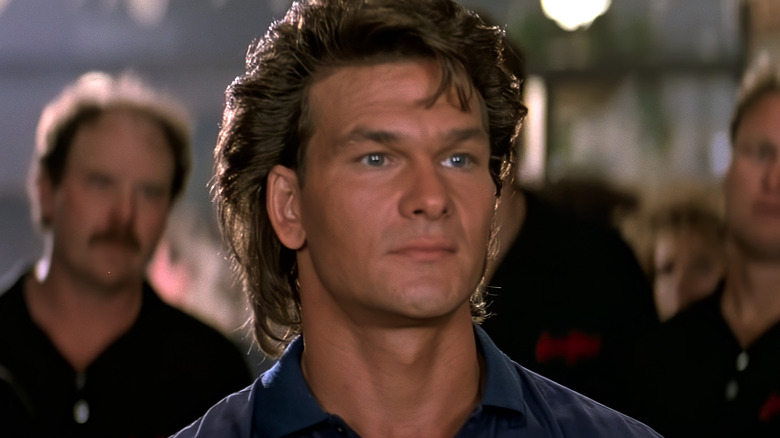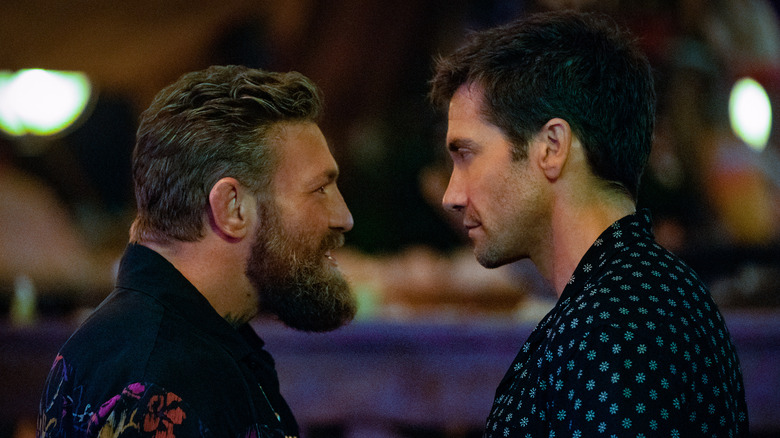The Road House Remake Drama & New AI Lawsuit Explained
The road to "Road House" 2024 is becoming even more complicated. Just a day before the first look at the remake of the '80s classic debuted, director Doug Liman penned a lengthy guest column for Deadline, revealing that he would be boycotting the SXSW premiere of his film. His protest stemmed from his disappointment that Amazon MGM Studios refused to give the picture a theatrical release, sending it instead to Amazon Prime Video. "The facts: I signed up to make a theatrical motion picture for MGM," he wrote. "Amazon bought MGM. Amazon said make a great film and we will see what happens. I made a great film."
The drama surrounding the remake has continued, and it's grown even more chaotic. Star Jake Gyllenhaal backed Amazon earlier this week, understanding why the film is heading straight to Prime Video. Now, tensions are rising even higher, as the OG film's writer is suing Amazon. Variety reports that R. Lance Hill, the writer behind the Patrick Swayze-starring classic, is going after Metro-Goldwyn-Mayer Studios and Amazon Studios for copyright infringement. Filings show that Hill, whose pen name is David Lee Henry, claims Amazon went ahead with the remake, despite Hill trying to get the rights back.
Hill filed a petition in 2021 to regain the rights to the film, as United Artists' claim was supposed to expire in November 2023. The suit alleges that Amazon (which folded United Artists into MGM) ignored his claim. Even more potentially damning is that Hill suggests the studio utilized artificial intelligence to recreate the voices of actors during the 2023 SAG-AFTRA strike. Hill's suit says that AI was used to speed up production ahead of its November 2023 wrap date, which had to be met in order to avoid the rights reverting to Hill.
The original Road House writer says Amazon used AI to recreate actor voices
During the SAG-AFTRA strike, actors weren't allowed to promote, star in, or do any work related to upcoming projects. R. Lance Hill's suit states that Amazon used AI to recreate actors' voices for ADR (Automated Dialogue Replacement, recorded in a studio after filming to make dialogue clearer). Furthermore, in his lawsuit, Hill claims that production on "Road House" 2024 didn't end until January — that's two months after the copyright deadline had passed.
With his suit, Hill is aiming to block the distribution of the remake and seek "declaratory relief." In a statement issued to Variety, an Amazon MGM spokesperson refuted Hill's claims, writing, "The lawsuit filed by R. Lance Hill regarding 'Road House' today is completely without merit and numerous allegations are categorically false," adding, "The film does not use any AI in place of actors' voices. We look forward to defending ourselves against these claims."
As AI continues to advance, it has become a hot topic in Hollywood. Many actors are concerned that the rise of technology will replace jobs and limit artistic endeavors. A studio source close to Variety says that "Road House" 2024 didn't utilize AI to recreate the voices of actors. The source also notes that filmmakers were explicitly told by the studio not to use AI.
The Road House controversy is complicated and exhausting
It remains to be seen what comes of R. Lance Hill's lawsuit and if Amazon Prime Video will push the release of the "Road House" remake back. As of this writing, Amazon intends on debuting the picture at SXSW and is moving forward with its late March streaming release. And despite Hill's allegations, he is set to receive a "story by" credit on the upcoming remake.
What's fascinating is how, of all the movies that are slated to come out in 2024, it's the "Road House" remake that's proven to be the most controversial. The drama surrounding the remake is layers deep, with its lead star, director, studio, and now-original writer all saying different things, resulting in a stew of chaos.
Director Doug Liman insists that "Road House" is a film that deserves to be seen on the big screen and that Amazon isn't giving the remake the platform it deserves. He also argues that the studio is actively trying to steer audiences away from cinemas. However, a separate Variety report suggests that Liman and lead star Jake Gyllenhaal opted for a streaming release because it led to a bigger payday. Gyllenhaal told Total Film that he appreciated Liman's championing of the theatrical experience while also acknowledging that Amazon was clear about the film's streaming debut.
With Hill's suit, things become even more complicated. Now the film has found itself in the middle of the whole AI x Hollywood conversation that many can't seem to ignore. The writer's lawsuit also suggests that Amazon was up to no good in trying to move forward with the film, despite the suggestion that he was supposed to get the rights back. It's a lot, and we're definitely here for it.


